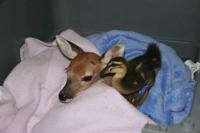Currently, there are only 13 permitted rehab centers in the entire state, and some only serve birds or deer.
What happens to injured or orphaned wildlife in Alabama when the handful of state licensed volunteer rehabilitation centers are full? Sadly, the animals are almost always euthanized.
Now the nonprofit Alabama Wildlife Rehabilitation and Conservation Society is hoping the state's Department of Conservation, Division of Wildlife and Freshwater Fisheries that oversees will grant them a meeting and make changes to the way they manage the state's volunteer wildlife rehab centers.
The group started a , demanding a meeting to explore ways the state could tweak the program and allow more willing volunteers to step in and provide care for these native species.
Michael Shehan serves as the president of the group and said they formed out of desperation after the last 10 years of permits being pulled and new permits being denied.

"People are ignored, and they are not responded to," Shehan told Ãå±±ÂÖ¼é on Wednesday.
Currently, there are only 13 permitted rehab centers in the entire state, and some only serve birds or deer. There are currently only three facilities taking in mammals like skunks and racoons, but Shehan said they are already at capacity. Those mammals are considered Rabies Vector Species, and permits are heavily regulated.
In 2014, there were more than 100 licensed wildlife rescues/rehabilitators, but Shehan said the state began pulling permits without a clear explanation.
"There needs to be more rehabilitators allowed in the state, and they need to streamline it and make it where people can access the application," Shehan said.
Right now, the nonprofit is asking for a meeting with state wildlife managers to establish new criteria for non-releasable wildlife, providing another option to the current euthanasia protocols in place.
Shehan said because of the lack of options, hundreds of wild animals are being taken in and cared for by unlicensed and untrained people. He calls it the underground rehab movement.
“When people find these animals and can’t find a rehabilitator to take them, then people are not cruel. They’re going to try to help the animal. Then you have untrained people in dangerous situations," Shehan said.
This group is hoping that state officials will hear them out and make some changes to allow for more volunteers to become licensed to handle these creatures. Their group will travel Saturday to Eufaula at the Lake Point Lodge to attend and address the state's Conservation Advisory Board members.Â

The Department of Conservation, Division of Wildlife and Freshwater Fisheries responded Wednesday afternoon to Ãå±±ÂÖ¼é's request for an interview, saying they were not available this week but did direct our newsroom to the FAQ section of their website.Â



















